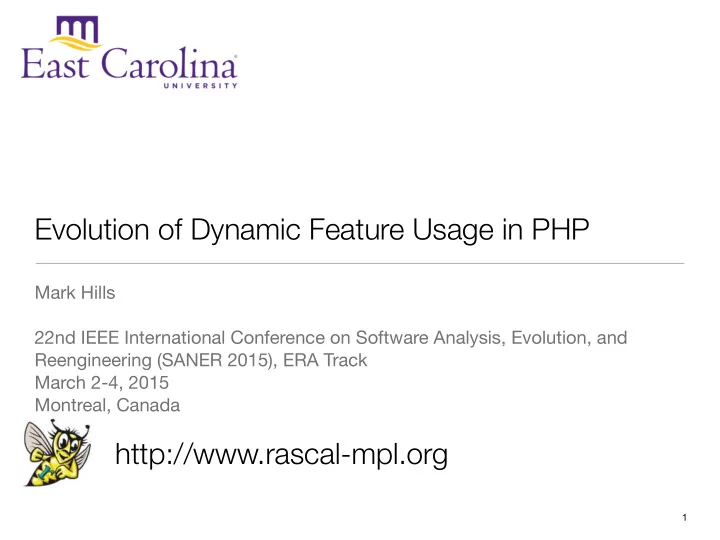

Evolution of Dynamic Feature Usage in PHP Mark Hills 22nd IEEE International Conference on Software Analysis, Evolution, and Reengineering (SANER 2015), ERA Track March 2-4, 2015 Montreal, Canada http://www.rascal-mpl.org 1
PHP Analysis in Rascal (PHP AiR) • PHP AiR: a framework for PHP source code analysis • Domains: • Program analysis (static/dynamic) • Software metrics • Empirical software engineering 2
PHP Analysis in Rascal (PHP AiR) • PHP AiR: a framework for PHP source code analysis • Domains: • Program analysis (static/dynamic) • Software metrics • Empirical software engineering 3
PHP Analysis in Rascal (PHP AiR) • PHP AiR: a framework for PHP source code analysis • Domains: • Program analysis (static/dynamic) • Software metrics • Empirical software engineering 4
What do we want? Soundness, precision… • Example: static taint analysis • Sound: we don’t want false negatives • We want to find all possible uses of “tainted” values in security- conscious code • Precise: we don’t want false positives • We don’t want to report errors that are not real errors, i.e., that cannot cause problems at runtime 5
So, what’s the problem? • Soundness and precision often conflict! • We need to make engineering trade-o ff s to build realistic tools, make tools “soundy” and more precise • We need to do this carefully, based on evidence: • Which features do we have to support? • Do we have to support dynamic features in their full generality? • Can we find patterns that we can exploit to help? 6
Here: determine usage patterns over time • How has the profile of dynamic feature usage changed over the release history of PHP systems? • Why has this changed? Why do we see features appear and/or disappear? • Can we extract information (e.g., usage patterns) from this to help us build better program analysis tools? 7
Setting Up the Experiment: Tools & Methods http://cache.boston.com/universal/site_graphics/blogs/bigpicture/lhc_08_01/lhc11.jpg 8
Building an open-source PHP corpus • Original corpus: 19 open-source PHP systems, 3.37 million lines of PHP code, 19,816 files • Select two systems: WordPress and MediaWiki • Why these two? • Widely used, long release histories (2003 to now) • Study encompasses 93 releases of WordPress, 189 releases of MediaWiki, roughly 90 million SLOC 9
Methodology • Scripted extract of releases from GitHub, all code parsed with an open-source PHP parser • Dynamic features identified using pattern matching • Raw numbers extracted to CSV files, trends computed with Rascal • More in-depth explorations performed manually or using custom- written analysis routines • All computation scripted, resulting figures and tables generated • http://www.rascal-mpl.org/ 10
Which dynamic features? • Variable Constructs • Overloading • eval 11
Which dynamic features? • Variable Constructs • Lets you use variables instead of identifiers • Usable for variables, properties, class names, method and function names, etc. $fields = array( 'views', 'edits', 'pages', 'articles', 'users', 'images' ); foreach ( $fields as $field ) { if ( isset( $deltas[$field] ) && $deltas[$field] ) { $update->$field = $deltas[$field]; } } 12
Which dynamic features? • Overloading • Handles access to undefined or non-visible properties and methods function __call( $fname, $args ) { $realFunction = array( 'Linker', $fname ); if ( is_callable( $realFunction ) ) { wfDeprecated( get_class( $this ) . '::' . $fname, '1.21' ); return call_user_func_array( $realFunction, $args ); } else { $className = get_class( $this ); throw new MWException( “…” ); } } 13
Which dynamic features? • eval • evaluates arbitrary PHP code while ( ( $line = Maintenance::readconsole() ) !== false ) { // elided... try { $val = eval( $line . ";" ); } catch ( Exception $e ) { echo "Caught exception " . … continue; } // elided... } 14
Threats to validity • Results could be very specific to either WordPress or MediaWiki 15
Threats to validity • Results could be very specific to either WordPress or MediaWiki • Mitigation: expanding to include other systems, plus results seem reasonable based on earlier work 16
Interpreting the Results 17
Zooming in: Variable Features • Variable properties are becoming more common (why? speculation: PHP is now OO, more code is moving to use OO features) • Variable variables common in some systems, decreasing in others • Di ff erences in usage between di ff erent applications = no overall trend for many of these features • There may be patterns we can exploit here for better precision… 18
A pattern example… $fields = array( 'views', 'edits', 'pages', 'articles', 'users', 'images' ); foreach ( $fields as $field ) { if ( isset( $deltas[$field] ) && $deltas[$field] ) { $update->$field = $deltas[$field]; } } 19
Zooming in: Overloading • Fairly stable in MediaWiki, with a spike at the end caused by a decrease in SLOC • Increasing use in WordPress • Still rare, but becoming more important • Need type inference to really know impact: how often are these actually used? (we’re working on this now…) 20
Zooming in: eval and create_function • Never popular, trend moving generally down • Many uses replaced with callbacks (still dynamic, but less dynamic) • Remaining uses in MediaWiki for admin, testing • Libraries are important here too: PCLZip in WordPress was the source of most of the eval uses there… 21
Summary 22
What have we learned? What’s left? • Variable features need to be modeled, variable properties are becoming more common, patterns may help • Overloads are still rare, but we need ways to detect where they are used • Eval and create_function are, thankfully, quite rare • Future: need to expand the feature set and corpus • Non-covered variants, other dynamic features • Cover more systems, further expand corpus 23
Discussion Thank you! Any Questions? • Rascal: http://www.rascal-mpl.org • Me: http://www.cs.ecu.edu/hillsma 24
Recommend
More recommend